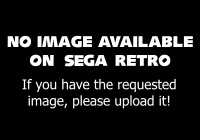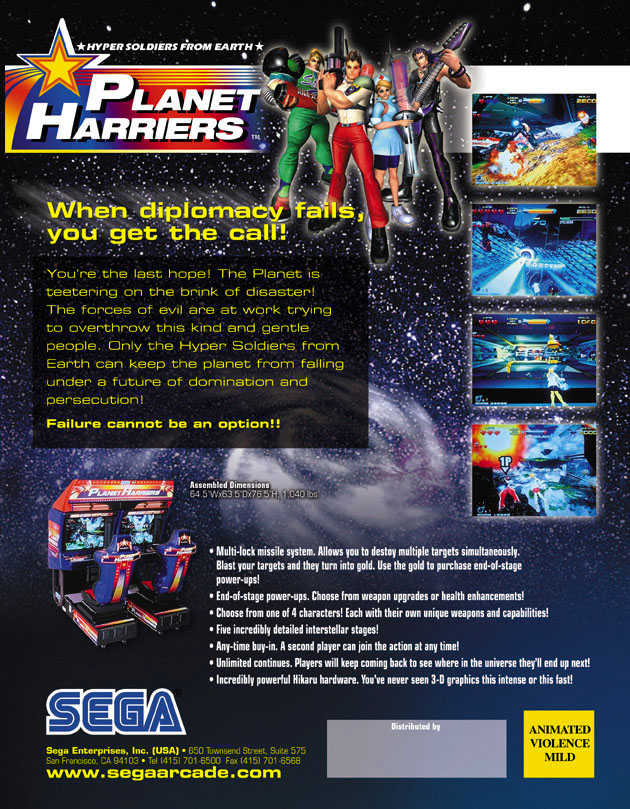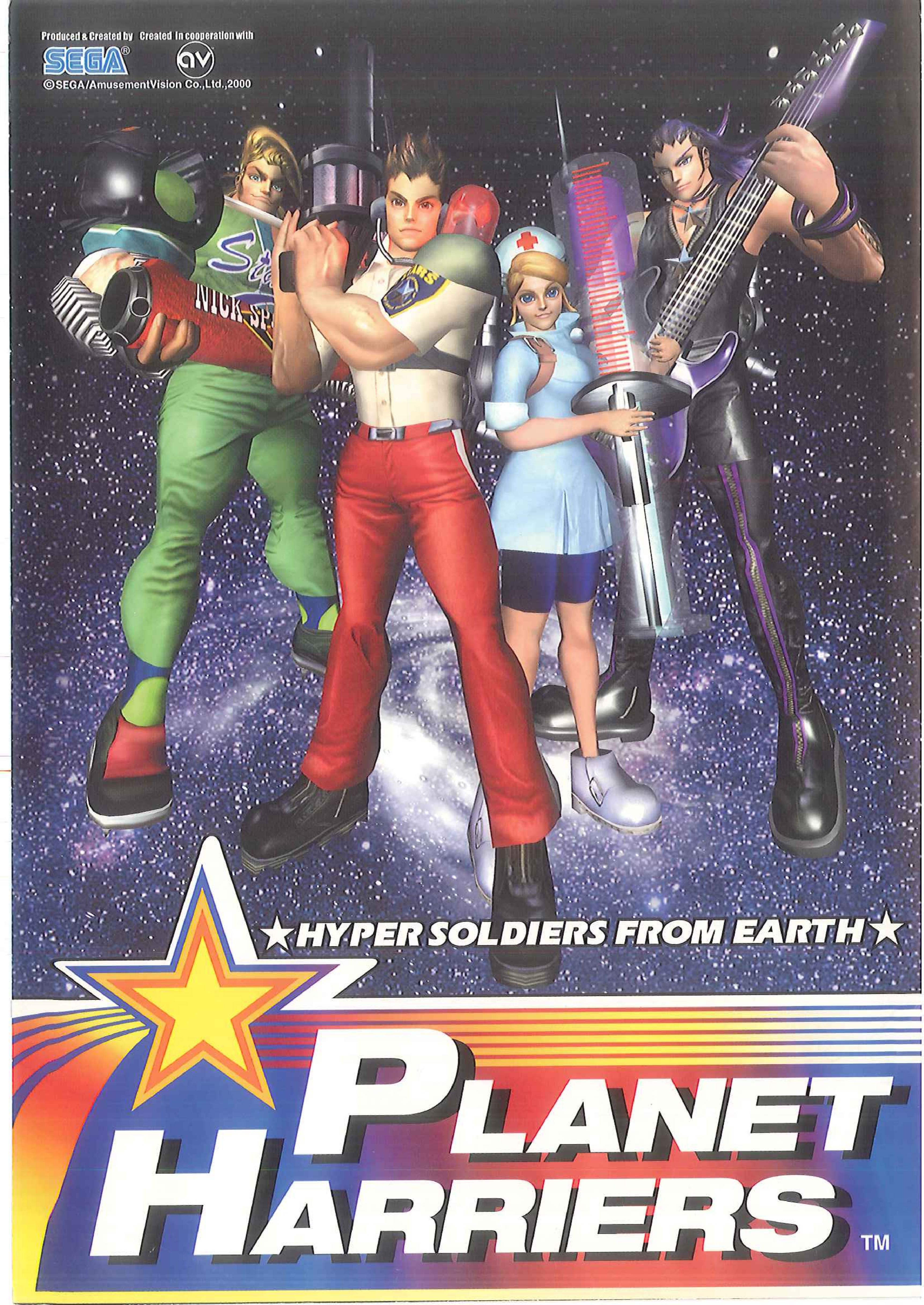Difference between revisions of "Planet Harriers"
From Sega Retro
| Line 3: | Line 3: | ||
| publisher=[[Sega]] | | publisher=[[Sega]] | ||
| developer=[[Amusement Vision]] | | developer=[[Amusement Vision]] | ||
| + | | support=[[Digital Design Studio]] | ||
| system=[[Sega Hikaru]] | | system=[[Sega Hikaru]] | ||
| romsize=294 MB | | romsize=294 MB | ||
Revision as of 07:25, 9 August 2022
| Planet Harriers | |||||||||||||||||
|---|---|---|---|---|---|---|---|---|---|---|---|---|---|---|---|---|---|
| System(s): Sega Hikaru | |||||||||||||||||
| Publisher: Sega | |||||||||||||||||
| Developer: Amusement Vision | |||||||||||||||||
| Supporting companies: Digital Design Studio | |||||||||||||||||
| Genre: Shoot-'em-Up | |||||||||||||||||
| Number of players: 1-2 | |||||||||||||||||
|
This short article is in need of work. You can help Sega Retro by adding to it.
Planet Harriers is a rail shooter arcade game developed by Amusement Vision and published by Sega for Sega Hikaru hardware in 2000. It is an original entry in the Space Harrier series, and the first since Space Harrier II in 1988.
Planet Harriers is different from all other Space Harrier games, in that it has four selectable characters and is presented entirely in 3D. The players have health bars, and enemies can be locked onto similar to After Burner.
Utilizing the powerful Sega Hikaru hardware, it demonstrated advanced graphical capabilities, such as Phong shading, a long draw distance, particle effects, and many polygons and light sources on screen. At the time of its release in 2000, it was regarded as having the best video game graphics seen up until that time.[2] It debuted at the Amusement Machine Show 2000, where it was the biggest crowd-pleaser.[3] The game was a popular arcade hit in Japan.[4]
Contents
Gameplay
Planet Harriers uses a twin seated cabinet, which allows for two players to play simultaneous single-player games, or a networked two-player game. Control is through a joystick with a missile and bullet trigger, and view-change and bomb buttons on the main panel. A player may select one of four characters; Glenn, X, Cory or Nick. Gameplay involves the character flying from an into-the-screen perspective, shooting oncoming enemies and missiles.
In a two player game, the two characters may 'dock' together in order to recover life.
Stages

|
Windel |
|---|---|

|
Foreo |

|
Lavaa |

|
Cavern |

|
Galax |
Production credits
- Main program director: Tetsuya Kaku
- Enemy control & visual system programmer: Hisashi Endo
- Motion control & texture system programmer: Naohiro Hirao
- Lighting effects & sound control system programmer: Jun Tokuhara
- Graphic library system & effects programmer: Yoshinori Suzuki
- Enemy control & effects system programmer: Eiji Takaki
- Special effects programmer: Ayumu Kasai
- Motion design director: Kazuhiro Izaki
- Motion designer: Akira Morimoto
- Character design director: Mika Kojima
- Character designer: Souichiro Kugo
- Stage Design Director: Junichi Yamada
- Stage Designer: Yukio Oda, Makoto Kawai, Kumiko Sakurai
- Assistant stage designer: Mari Sasaki
- Graphic designer: Tsuyoshi Fukuyama
- Sound effects director: Michika Okuyama
- BGM sound director: Sakae Osumi
- Assistant sound creator: Hidenori Shoji, Maki Morrow
- Music composer: HΛL
- HΛL is: Toshiharu Umesaki, Atsushi Sato, Tomotaka Takehara, Akihisa Matsuda, Katsuyuki Ozawa
- Coordinated by: Artimage Inc.
- : Shunsuke Suzuki, Toshiyuki Kishi
- Coordinated by: megastone Co., Ltd.
- Voice actor:
- Glenn: Roy Garner
- Cory: Lynn Marie Harris
- Nick: Barry Gjerde
- X: Brian Matt Uhl
- narrator: Chris Glenn
- Coordinated by: Poly Co., Ltd.
- Mechanical supervisor: Masao Yoshimoto
- Mechanical engineer: Toshiya Yamaguchi
- Electrical engineer: Toru Mori, Nobuto Kashiwagi
- Cabinet designer: Kimio Tsuda
- Assistant: Mika Sato, Masae Otoshi
- Special thanks: Motoyoshi Tai, Mitsunori Kabashima (Digital Design Studio)
- Producer & director: Toshihiro Nagoshi
- Created in cooperation with: Amusement Vision
- Produced and Created by: Sega
Digital manuals
Magazine articles
- Main article: Planet Harriers/Magazine articles.
Promotional material
Photo gallery
Physical scans
| Hikaru, US | ||||
|---|---|---|---|---|
| Hikaru, JP | ||||
|---|---|---|---|---|
| Hikaru, UK | ||||
|---|---|---|---|---|
Specifications
Dimensions
|
|
| Mass: 471 kg (1,036 lbs) |
References
- ↑ Sega Arcade History, Enterbrain, page 174
- ↑ http://ign.com/articles/2000/09/21/jamma-2000-hands-on-with-planet-harriers
- ↑ Official Dreamcast Magazine, "December 2000" (US; 2000-10-31), page 19
- ↑ https://www.segasammy.co.jp/japanese/ir/library/pdf/printing_archive/2002/sega/sega_annual_tuuki_2002.pdf#page=18
- ↑ File:PlanetHarriers_Arcade_JP_Flyer.pdf
| Space Harrier series |
|---|
| Space Harrier (JP home computers | Elite versions | Sega Ages Vol. 2 | mobile | 3D) (1986) | Space Harrier 3D (1988) | Space Harrier II (Electronic) (1988) | Planet Harriers (2001) | Typing Space Harrier (2002) | Sega Ages 2500 Series Vol. 4: Space Harrier (2003) |
| Albums |
| Yu Suzuki Produce Hang On/Space Harrier (1997) | Planet Harriers The Original Soundtrack (2001) | Space Harrier II: Space Harrier Complete Collection Original Soundtrack (2005) |
| Other Media |
| Space Harrier (video) (1987) | Space Harrier: White Dragon no Yuusha (1988) |






